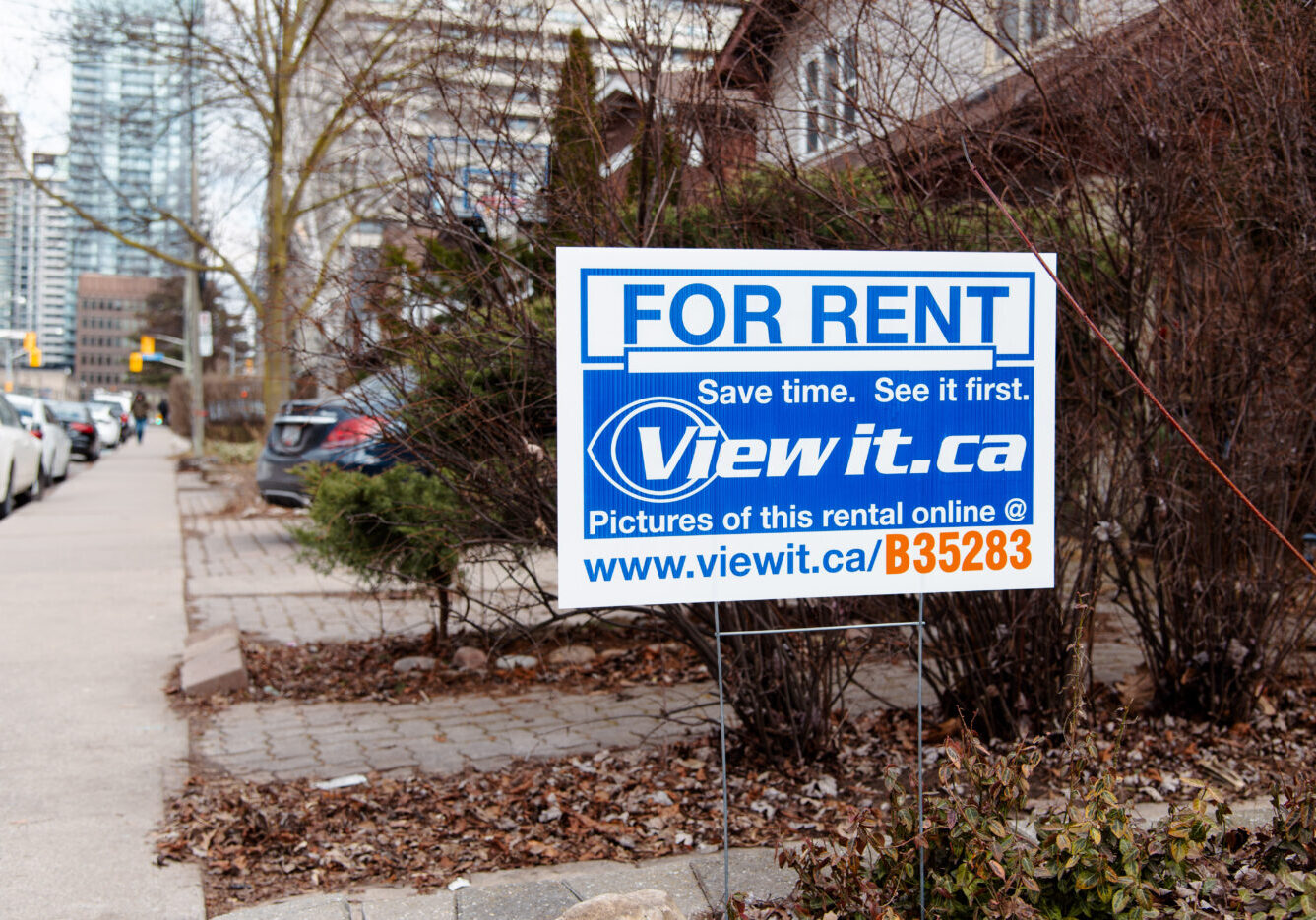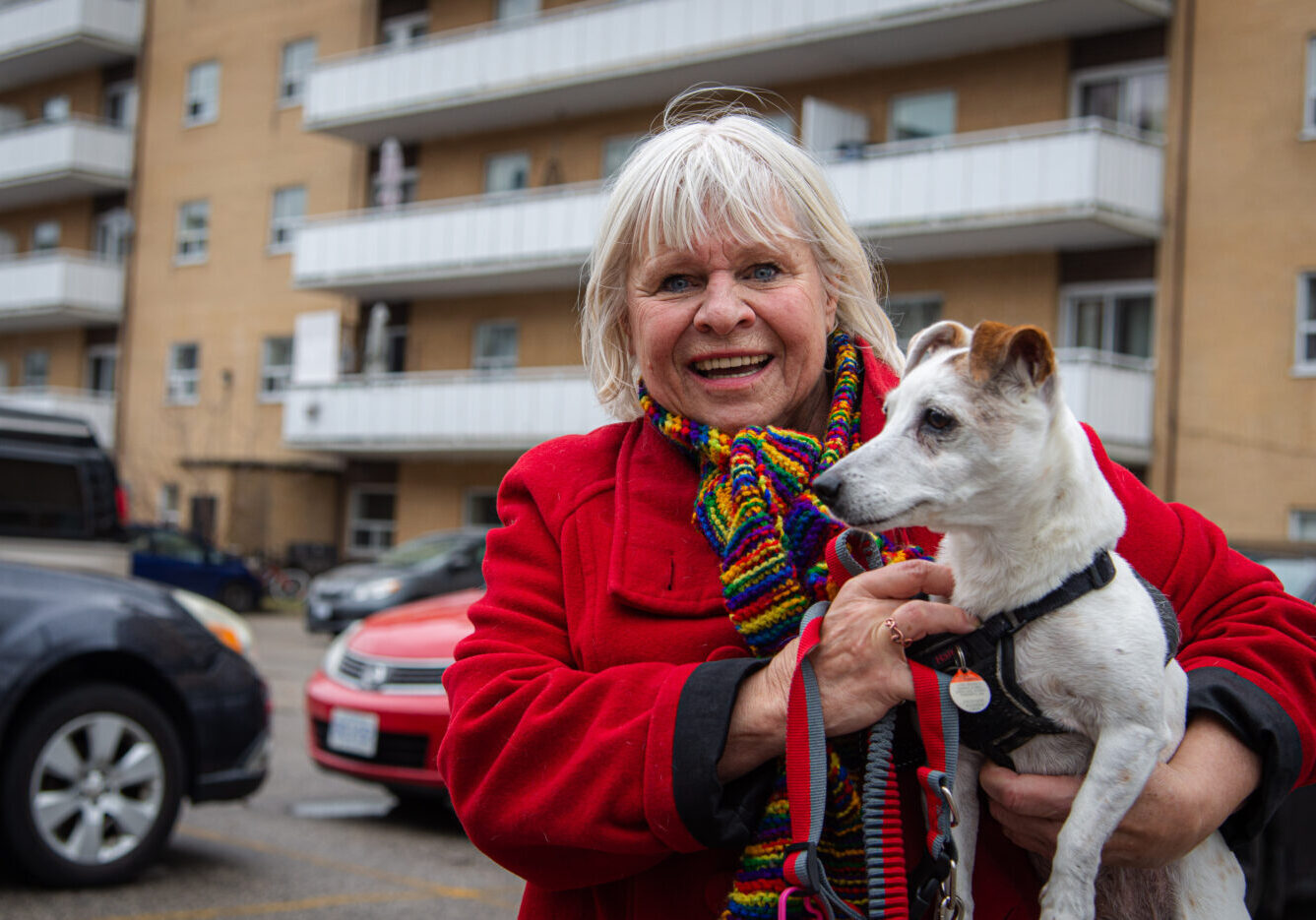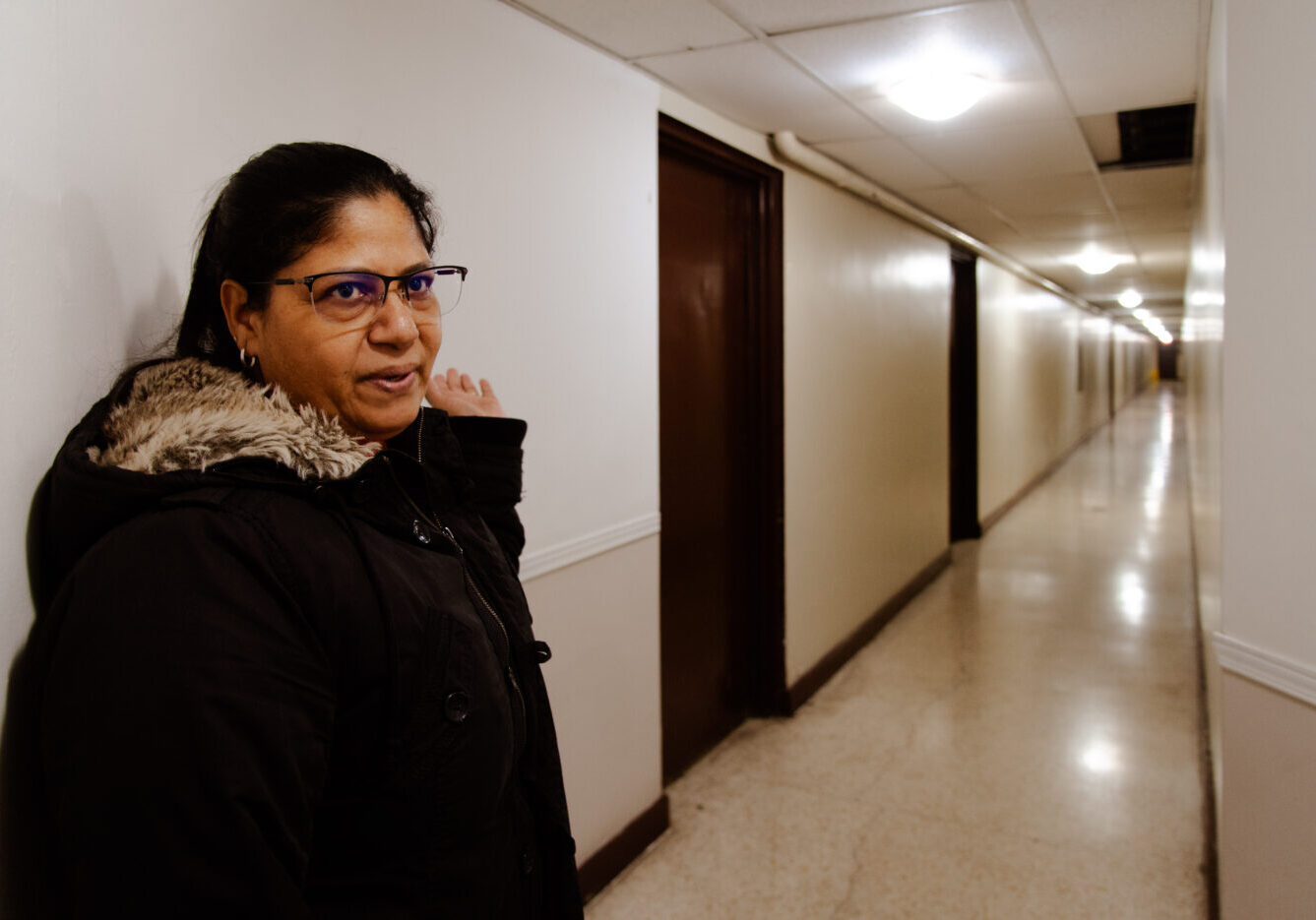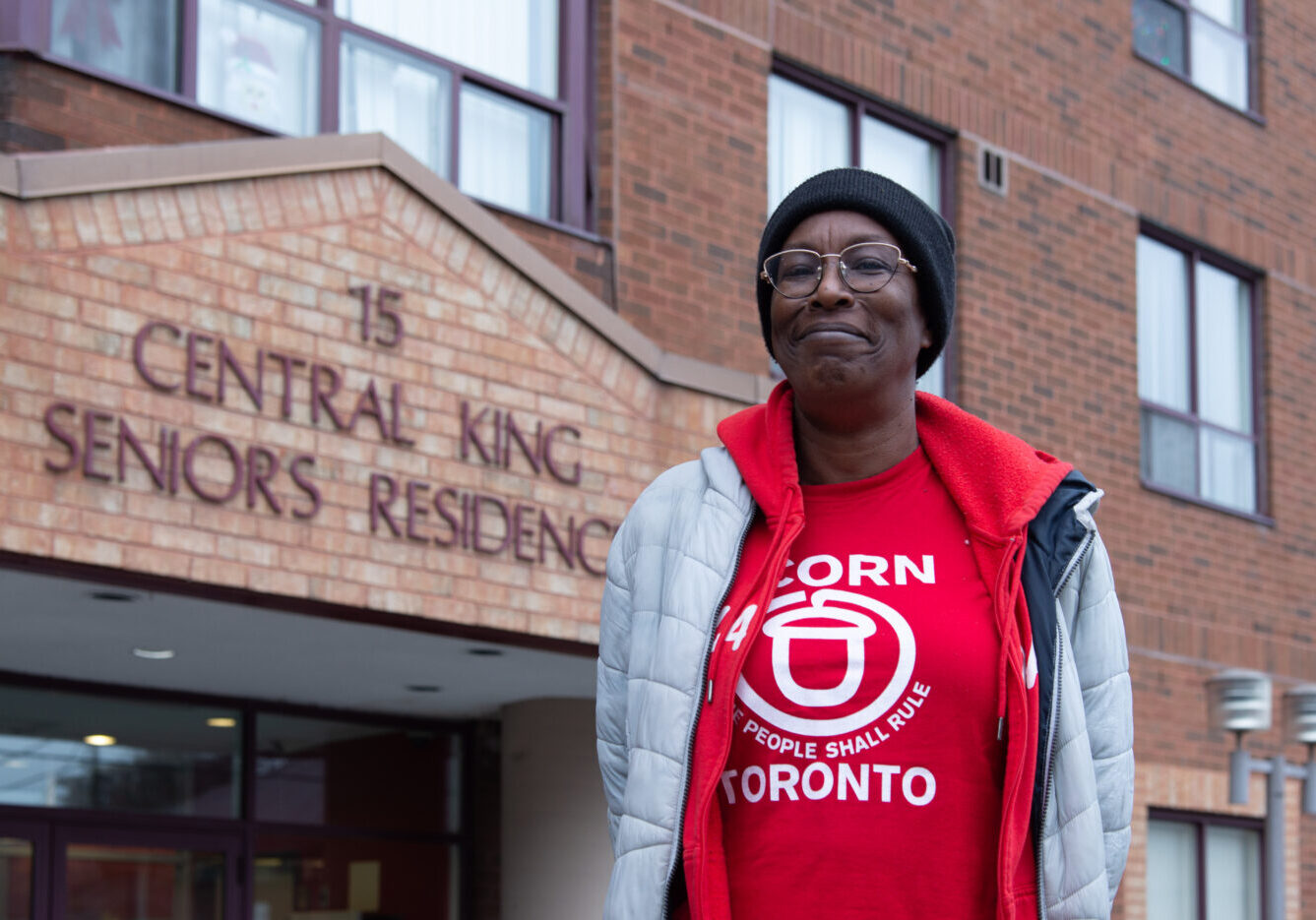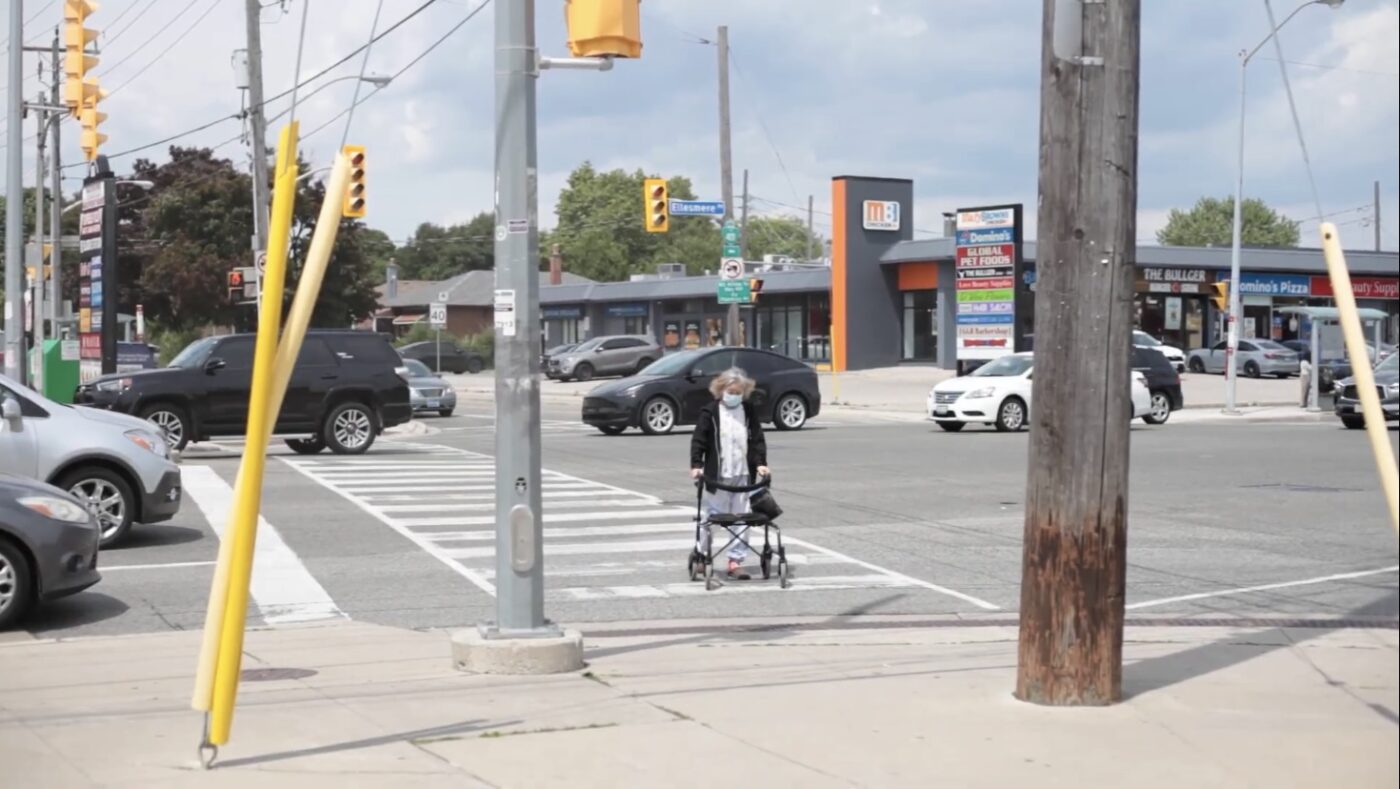PART 1
LESS THAN 1 IN 6 TORONTONIANS CAN AFFORD TO BUY A HOME IN THE CITY. WHAT ABOUT THE REST OF US?
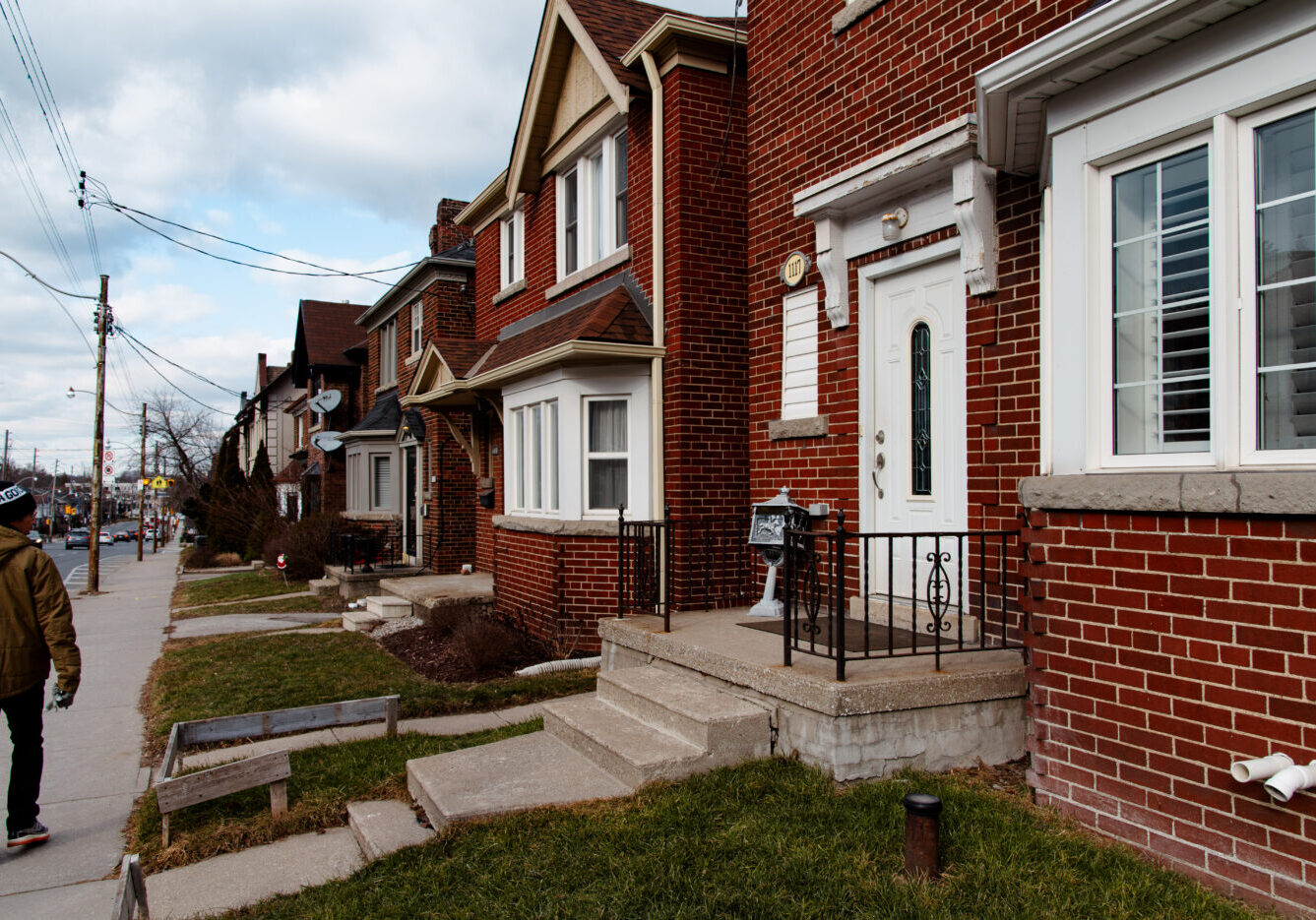
THE MEDIAN INCOME EARNER IN TORONTO NOW NEEDS TO SAVE FOR MORE THAN 25 YEARS TO AFFORD A DOWN PAYMENT ON A HOUSE IN TORONTO, WHICH NOW AVERAGES AT AROUND $1.2 MILLION.
📸: ALOYSIUS WONG/THE GREEN LINE.

ALOYSIUS WONG
Toronto Metropolitan University Master of Journalism graduate. Lives in North York where he prays that the Eglinton Crosstown will eventually be completed.
March 4, 2024
I’m 25 years old, and I may never own a home in Toronto.
At least, that’s what the math says.
Last year, the average selling price of a Toronto home was $1,126,604, according to the Toronto Regional Real Estate Board. But it cost half that at $566,611 just a decade ago, and two decades ago, the average cost was $315,231. Fifty years ago, in 1974, the price of a house was more than 20 times less compared to today at $52,806.
To put 2024 numbers into perspective, a Ratehub.ca analysis found that you’d need to earn over $200,000 a year to afford a home in Toronto. In an email to The Green Line, Statistics Canada wrote that only 15.5 per cent of households in the Toronto census metropolitan area earned $200,000 or more as of 2021. For individuals who earn that much, this number is under 10 per cent.
Simply put, for the overwhelming majority of Torontonians — that’s nearly 85 per cent or almost 5.5 million people across the GTA — owning a home in the city remains perpetually out of reach, whether that’s a condo or house. This reality is backed up by the banks as well: A February 2024 analysis by the National Bank of Canada reported that people who earn a median household income for Toronto — that’s $96,031 annually — would have to save for almost five years to afford a down payment on a condo unit and for more than 25 years on a house.
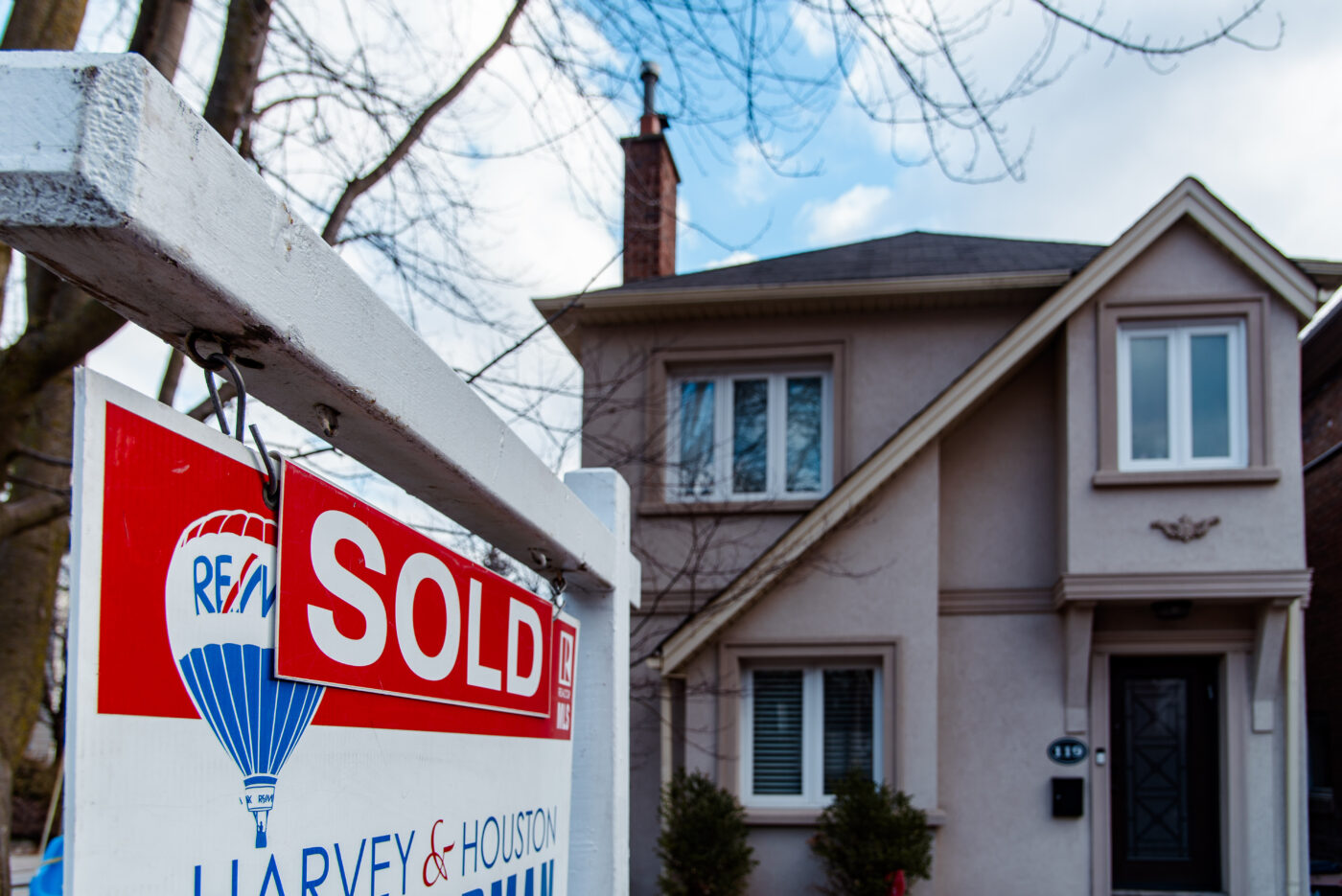
A house is sold near Yonge and Eglinton in February 2024. Adjusting for inflation, the average home now costs four times more today than it did 50 years ago.
📸: Aloysius Wong/The Green Line.
“It’s untenable,” said Erik C., 27, who currently rents with his girlfriend. “And then you're just stuck in a cycle of putting money into a pit that doesn't generate anything — money in somebody else's pocket.”
In other words, if I earned the average Toronto salary and saved 10 per cent a year starting today, I’d only be able to afford a 20 per cent down payment for a house here when I turn 50.
Yes, inflation has had an impact on everything. But even when adjusting historical home prices for inflation, the cost has more than quadrupled in the last 50 years.
This chart uses figures from the Toronto Regional Real Estate Board, adjusted for inflation, to show how much more expensive housing is today:
Renting isn’t much easier. A July 2023 report by the Canadian Centre for Policy Alternatives (CCPA) found that Torontonians need to earn over $40 an hour — or about $80,000 a year — in order for market rent for a two-bedroom apartment in the city to be affordable at 30 per cent of their income. The CCPA points out that this is more than double the provincial minimum wage at $16.55, which means many rental units in Toronto are still out of reach for two of the city’s lowest earners.
“At the individual and family level, you’re putting people in a very hard situation,” Ricardo Tranjan, the report’s co-author, said in an interview with The Green Line. “You're forcing them to commute long hours. You’re forcing them to sacrifice other basic needs. Or you’re just putting them at the very direct risk of becoming unhoused.”
Tranjan, a political economist and senior researcher with the CCPA whose research focuses particularly on rental housing and income supports, says these consequences will make Toronto less attractive to top talent. There will also be a negative impact on other sectors of the local economy, he adds, whether that’s pressure for businesses to provide higher wages to help employees make rent, or reduced purchasing power since people have less disposable income.
“There's this clear understanding that rentier activities just suck wealth out of the economy,” Tranjan explains.
This reality has driven housing to become the leading issue and cause for concern for Torontonians. Housing was the number-one issue in last year’s mayoral by-election, with 90 per cent of people surveyed by The Green Line indicating it as their top priority.
Want to know what Mayor Olivia Chow promised to do to fix Toronto's housing crisis? Check out her response to our mayoral candidates survey.
There are a number of factors that have contributed to this systemic problem today. For one, many neighbourhoods here were historically zoned only for detached or semi-detached houses, which prevented the densification of most residential areas. The availability of affordable housing units is also shrinking, with the City of Toronto estimating that for every 15 affordable private units lost, one new unit is built.
What’s more, a February 2023 joint report by the Building Industry and Land Development Association and the Federation of Rental-housing Providers of Ontario found that 90 per cent of purpose-built rentals in the GTA were built more than 40 years ago, with 10 times fewer rental units built since 2000 than in the 1960s and ‘70s.
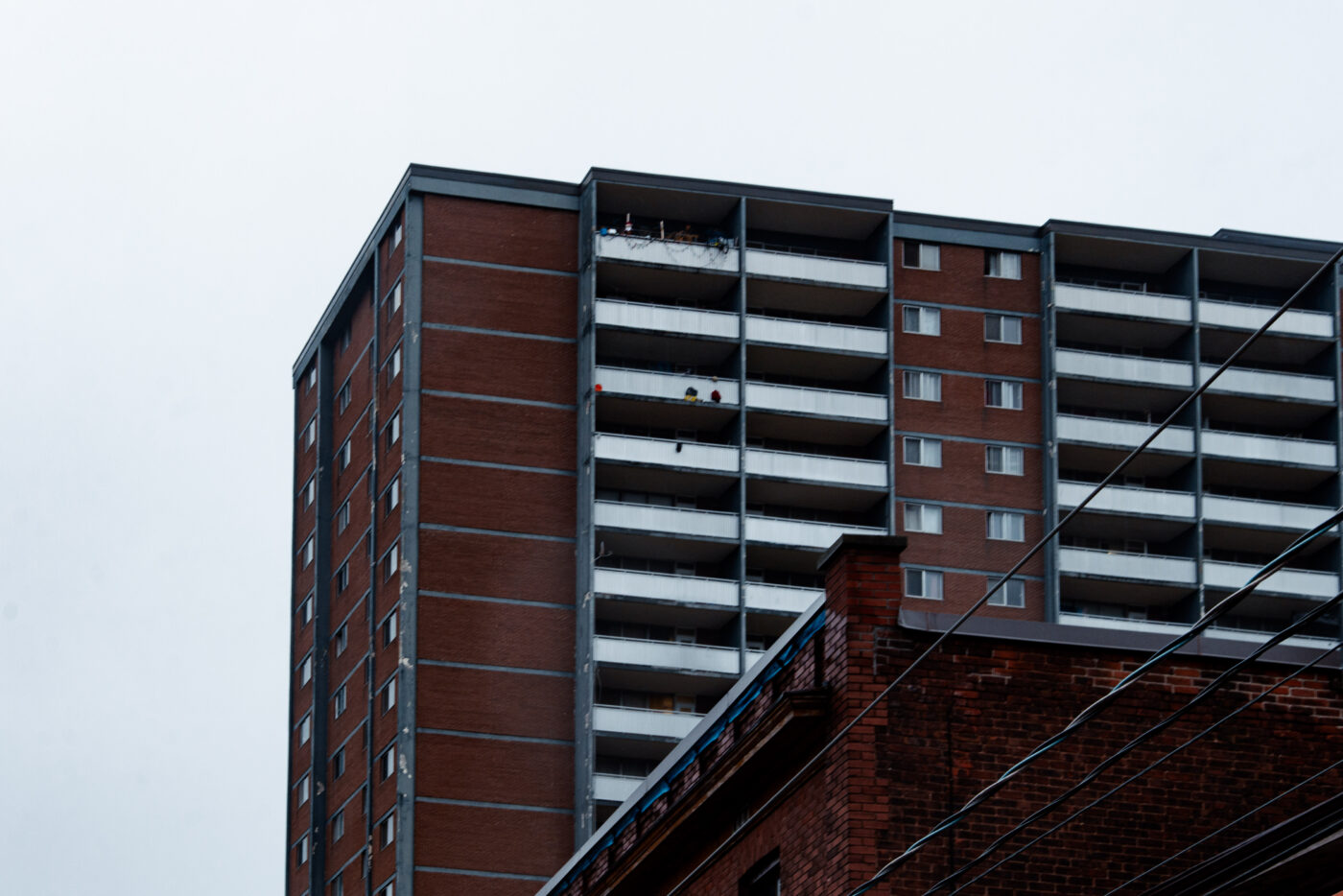
A rental apartment near Lawrence Ave. W. and Weston Rd. as seen in December 2023. Ninety per cent of purpose-built rentals in the GTA were built more than 40 years ago, with 10 times fewer rental units built since 2000 than in the 1960s and 1970s.
📸: Aloysius Wong/The Green Line.
Some of this is changing. Last May, City Council voted to approve multiplexes of up to four units throughout the city as part of a strategy to address Toronto’s housing crisis.
Just last December, the federal government announced $471 million of funding would be allocated to the city to build around 12,000 new housing units over the next three years.
But with Toronto expected to grow by 700,000 people by 2051, we will be experiencing a housing crunch for years to come. To adapt, some are turning to alternative living arrangements to cope with the costs, including having roommates or trying co-housing. Ultimately, however, costs are still too high for many Torontonians, and more and more people are being forced to leave the GTA altogether to make ends meet.
For now, many in the city continue to fight to secure and afford shelter amid this economic storm, while Torontonians of all stripes ask: What, if anything, can get us out of the housing crisis?
Today’s stories lead to tomorrow’s solutions, so sign up for our newsletter to take action on the issues you learn about in The Green Line.
PART 2
WHY IT’S HARD TO LIVE IN TORONTO FOR PRETTY MUCH EVERYONE

ALOYSIUS WONG
Toronto Metropolitan University Master of Journalism graduate. Lives in North York where he prays that the Eglinton Crosstown will eventually be completed.
March 11, 2024
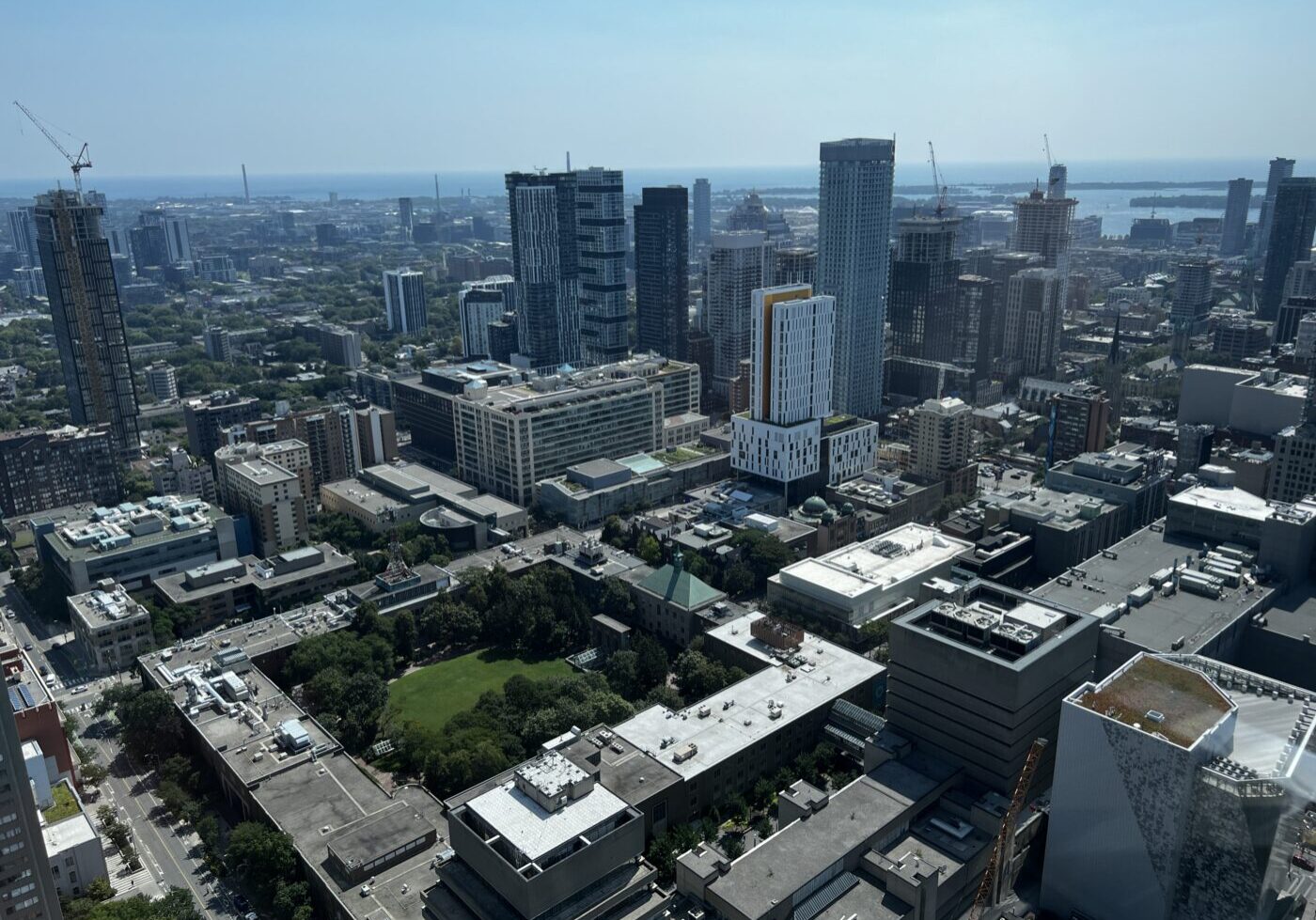
Downtown Toronto as seen from a condo near Yonge Street and Gerrard Street East. Asking rents for a two-bedroom apartment in Toronto now exceed $3,200 as of March 2024, according to Rentals.ca.

Intro
Over the last few months, The Green Line spoke with tenants from every corner of the city who are tired of being on the losing end of Toronto’s rental market.
From Weston and Scarborough to Long Branch and downtown, tenants of all backgrounds are experiencing the worst impacts of Toronto’s housing crisis.
For too many, the situation is dire; stable, affordable housing feels perpetually out of reach. Some work multiple jobs to make ends meet amid rising rents. Others describe decades-long patterns of poor maintenance in their buildings, only to be met with even more fees.
There’s a general feeling of helplessness among tenants in Toronto, according to Rikin Gurditta, a volunteer community organizer with Climate Justice Toronto and the York South-Weston Tenant Union, which organized rent strikes in several buildings near Lawrence Avenue West and Weston Road.
“Until we come knocking at their door, it seems like there's nothing you [can] do,” the 23-year-old says. “This is just a harsh reality that you swallow and you know that you're getting fucked.”
Gurditta believes that organizing is the only way for tenants to stand up for themselves. The current system designed to hold landlords accountable is either “not working or deteriorating,” he adds.
The Ontario Landlord and Tenant Board, for example, has received criticism for prioritizing applications from landlords to increase rents above provincially mandated guidelines over other cases, such as tenant grievances. Small landlords with fewer properties argue the move favours corporate landlords, while they struggle to evict tenants who haven’t paid rent for months. Tenant organizations like the Federation of Metro Tenants’ Associations also say it only serves to enrich corporations at their expense.
In The Green Line’s story series, tenants describe how difficult it is to secure a rental in the city, and the lengths they had to take to stand up to their landlords. Meanwhile, longtime elderly residents in a residential complex facing demolition say they’d rather die than be forced out of the home they’ve lived in for decades. Many Torontonians are fighting back — feeling as if they have no other option if they want to keep calling this city home.
Find out exactly how much money you need to cover your monthly rent, food and commute costs with The Green Line's cost-of-living calculator.
Rentals forever? Young Torontonians lament the million-dollar homeownership hurdle.
This 27-year-old feels like his monthly rent goes into ‘a pit that doesn't generate anything’ — a vicious cycle that keeps young people from achieving their financial goals.
“It felt greedy to me,” says Erik C., who asked not to be identified by full name so as not to impact the friendship with his former landlord. “I felt like she was taking advantage of the fact that it was a new build, and she could raise it to something that felt exorbitant.”
Silenced and scrambling: Toronto tenants navigate 'renovictions' and landlord fears in city's rental maze
Expert analysis shows that landlords kick out their tenants to perform renovations and raise their rent, leaving some renters afraid to confront them — even when they feel they’re right.
Some landlords evict tenants to perform extensive renovations, after which they tend to increase the asking rent, at times doubling it.

Analyzing over 160 cases of renoviction throughout Toronto, RenovictionsTO argues that financial penalties for landlords performing renovictions are “exceedingly rare” because their potential long-term profits often offset their fines.
How 'demovictions' blow up affordable rentals — and the communities that rely on them
One thousand tenants in five Long Branch apartments could be displaced in a proposed development, destroying what some have called home for decades.
Patti Pokorchak, a longtime resident of 230 Lake Prom., says her 'idyllic' community is at risk of being destroyed and becoming Canada’s largest-ever demoviction — affecting more than 1,000 renters in 548 units.

“Some of them are threatening MAID [medical assistance in dying],” says Patti Pokorchak, 69, describing two of her elderly neighbours. “They're at that age. They're fragile, in their 90s. They've lived there for 40, 50 years. They're not moving.”
It took 10 years to fix this woman's bathroom. But her landlord is still jacking up rent.
Tenants at 399 Markham Rd. say building management is quick to make cosmetic repairs, but slow to address issues inside their units.
Janak Ramcharran has lived in her Scarborough apartment since 2004. She says despite filing complaints, it took 10 years for building management to fix her bathroom, which had developed leaks and a hole in the ceiling.
📸: Aloysius Wong/The Green Line.
“I am paying you the money, so you can maintain my apartment — whatever needs to be fixed when the time comes,” says Janak Ramcharran, who has lived in her building since 2004. “Why do I have to pay you more for what you're spending outside in the building when you're not fixing my apartment?”
Why Toronto is in a housing 'state of emergency' — and who's affected most
Immigrants and people with disabilities are the most likely to live in unaffordable housing situations, according to analysts.
Marcia Stone, co-chair of the Weston chapter of the Association of Community Organizations for Reform Now (ACORN), says Toronto has moved past a 'housing crisis' and into a 'state of emergency.'
📸: Aloysius Wong/The Green Line.
Marcia Stone, co-chair of the Weston chapter of the Association of Community Organizations for Reform Now (ACORN), says many landlords treat tenants as a commodity to exploit. “We're no longer in a crisis — a housing crisis. We're in a state of emergency and it should be treated as such.”
Homeless shelters in Toronto are pushed to their limit. Social housing can't close the gap.
The City only houses about 500 unhoused people a year. Meanwhile, 99 per cent of emergency shelter spots are occupied every night in Toronto.
Dan Trayes protesting against the privatization of healthcare at Queen's Park in September 2023. Unhoused for 19 years, Trayes now has a subsidized apartment in Little Jamaica, but feels that without it he'd be homeless again.
📸: Dan Trayes/Twitter.
“Basically, if I had to leave tomorrow, I'd be homeless again,” says Dan Trayes, who was homeless in Toronto for 19 years before securing subsidized housing. “There's no way anybody is leaving affordable housing or RGI units — the real affordable housing — unless they're making at least like four or five grand a month.”
Why everyone needs to step up to solve Toronto's housing crisis
Governments at all levels are investing over $1 billion to address affordability in the city. But advocates say stricter regulations are also key to protecting tenants.
Deqa Nur's family moved to Canada from Somalia in 1993. Now a 43-year-old mother of three, she says subsidized housing was key to breaking her family out of poverty.
📸: Abigail Wedderburn.
“The city is trying. But I think the housing crisis — it's something that is going to need more than the city,” says Deqa Nur, a member of the City of Toronto’s Tenants First Advisory panel from 2017 to 2019 whose family moved into a rent-geared-to-income unit in 2007.
The Green Line’s
Cost-of-Living Calculator

HANS XU
Full-stack developer passionate about making accessible, easy-to-use software. Staunchly anti-bloat, but learns React out of necessity. Interested in cybersecurity and best practices for online privacy.
March 11, 2024

The Green Line's cost-of-living calculator helps you budget your monthly costs of food, rent and transportation in Toronto.

We get it — living in Toronto is expensive. And the costs are only going up.
From rent to food to transportation, Torontonians across the city are having to spend more for essential goods and services. Rents are higher than ever. A loaf of bread costs more now than it did a year ago. And TTC fare is the same whether or not you get stuck in a delay.
That’s why we made this affordability calculator to help you understand where your money is going, and better help you plan your finances, moving forward.
RENT
FOOD
Estimate how much you spend each month on food. Include both groceries and eating out (take out or dine in from restaurants, cafes, pubs and other food vendors).
Non-affiliated links of grocery store flyers for your convenience:
Some grocery stores also offer price matching.
TRANSPORTATION
Enter the locations of where you live and where you work. This information will be used to estimate the cost of transportation.
Total Cost of Living
Feedback about this calculator? Send us a note at hello@thegreenline.to.
Here's your chance to support the only independent, hyperlocal news outlet dedicated to serving gen Zs, millennials and other underserved communities in Toronto. Donate now to support The Green Line.
PART 3
KICKED AROUND THE SIX
A storytelling event hosted by Stories of Ours and The Green Line.
About the Event
In partnership with Stories of Ours, our storytelling event centres the experiences of people who’ve navigated our city’s challenging housing ecosystem, from renting to buying. Event attendees will have a chance to hear the stories, and then gather in small groups to brainstorm community-led solutions to navigate housing in Toronto. Dinner and refreshments provided. RSVP now for our in-person event.
Events are an essential part of our Action Journey. We want to empower Torontonians to take action on the issues they learn about in The Green Line — so what better way to do that than by bringing people together? From community members to industry leaders, anyone in Toronto who’s invested in discussing and solving the problems explored in our features is invited to attend. All ages are welcome unless otherwise indicated. Our only guidelines? Be present. Listen. Be kind and courteous. Respect everyone’s privacy. Hate speech and bullying are absolutely not tolerated. At the end of the day, if you had fun and feel inspired after our events, then The Green Line team will have accomplished what we set out to do. Any questions? Contact Us.
PART 4
A HOUSE IS NOT (NECESSARILY) A HOME
Event Overview
See what you missed
from our latest event.
Our community members brainstormed solutions to address different facets of Toronto's housing crisis.
Compiled by Adele Lukusa.
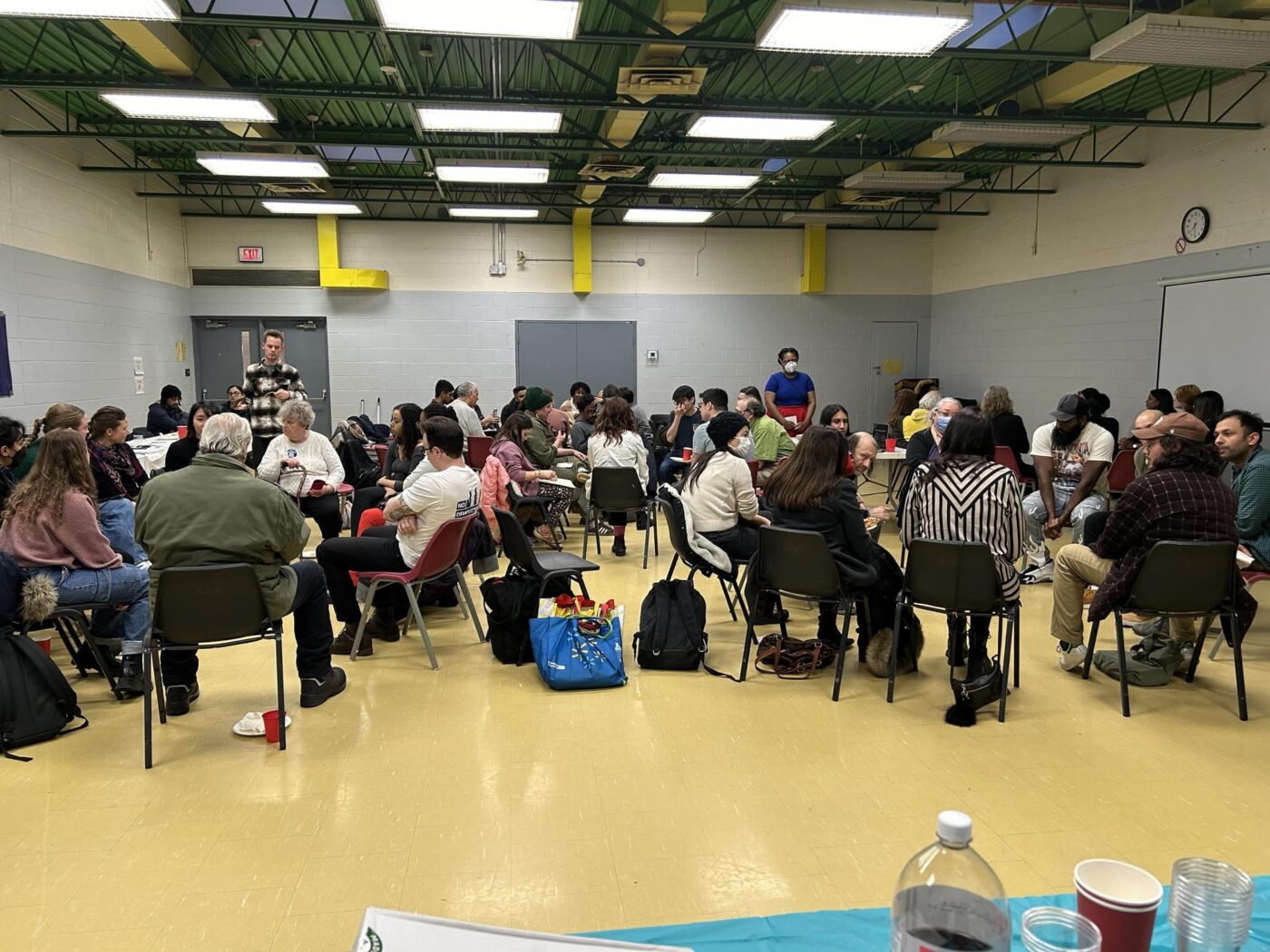
Attendees gather in Story Circles to share their personal experiences with housing in Toronto during The Green Line's Housing Crisis Action Journey at Lawrence Heights Community Centre on Tuesday, March 19, 2024.
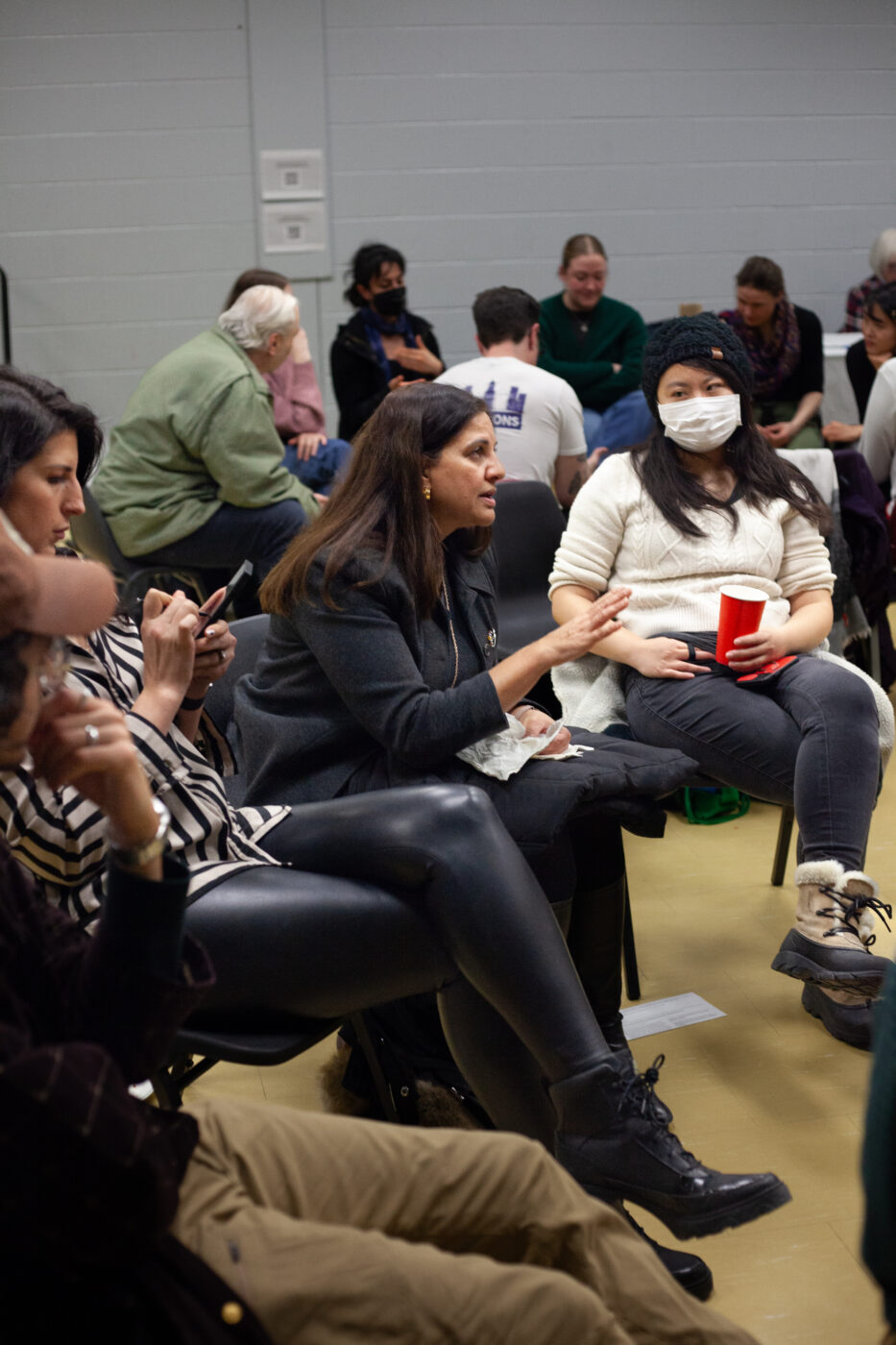
One attendee shares her personal experience with housing in a Story Circle during The Green Line's Housing Crisis Action Journey at Lawrence Heights Community Centre on Tuesday, March 19, 2024.
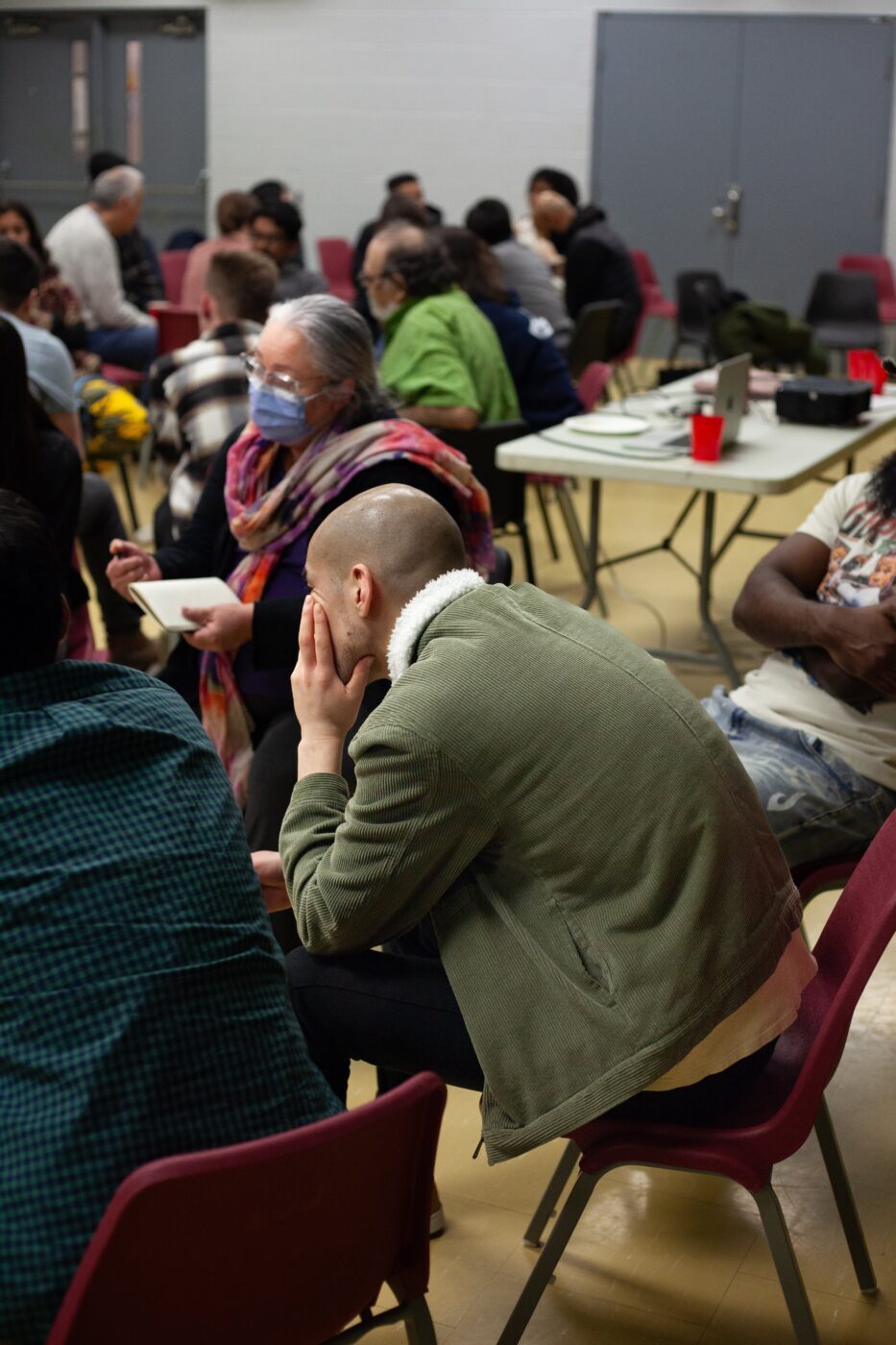
Storyteller Teru Ikeda listens intently as other attendees share their personal experiences with housing in Toronto during The Green Line's Housing Crisis Action Journey at Lawrence Heights Community Centre on Tuesday, March 19, 2024.
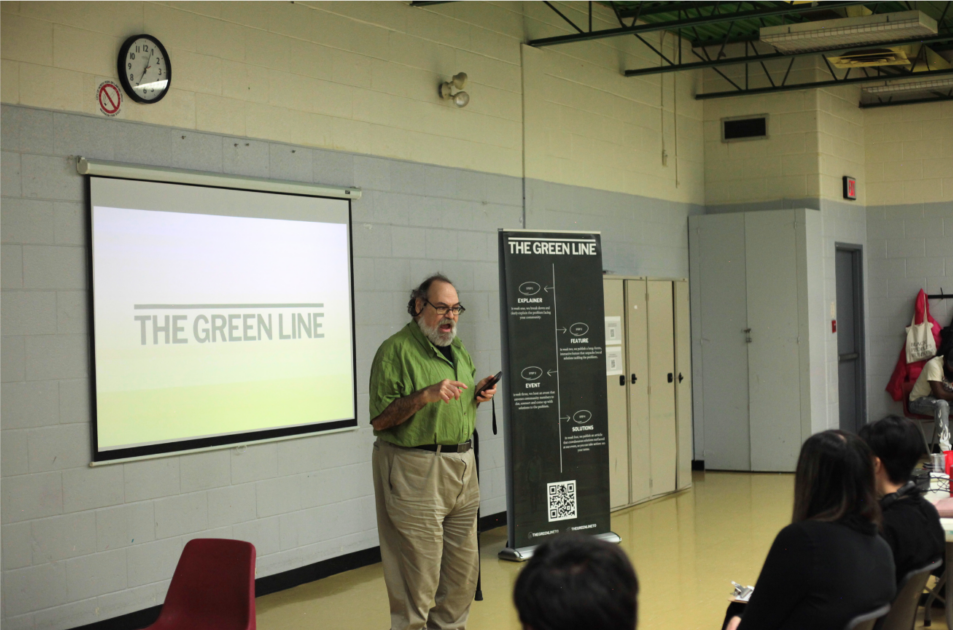
Storyteller Jeffrey Canton describes his personal experience with moving multiple times in Toronto during The Green Line's Housing Crisis Action Journey at Lawrence Heights Community Centre on Tuesday, March 19, 2024.
SOLUTIONS
ACTIONS
Do something about the problems that
impact you and your communities.
Join or Start a
Tenant Association
For renters, the Federation of Metro Tenants' Associations provides a list of already established tenant associations within the city, as well as workshops for anyone interested in organizing their own association.
Learn
the Basics
For those in need of a brief refresher of their rights as tenants or resources to share with family and friends in need, the Canadian Centre for Housing Rights has a range of articles and guides on everything from pet issues to student housing.
Get a
Pro's Opinion
Nonprofit Pro Bono Ontario offers free legal advice and assistance through their hotline, available from Monday through Friday between 9 a.m. and 5 p.m.
Join Our
Community
Continue the conversation with other Green Line community members.
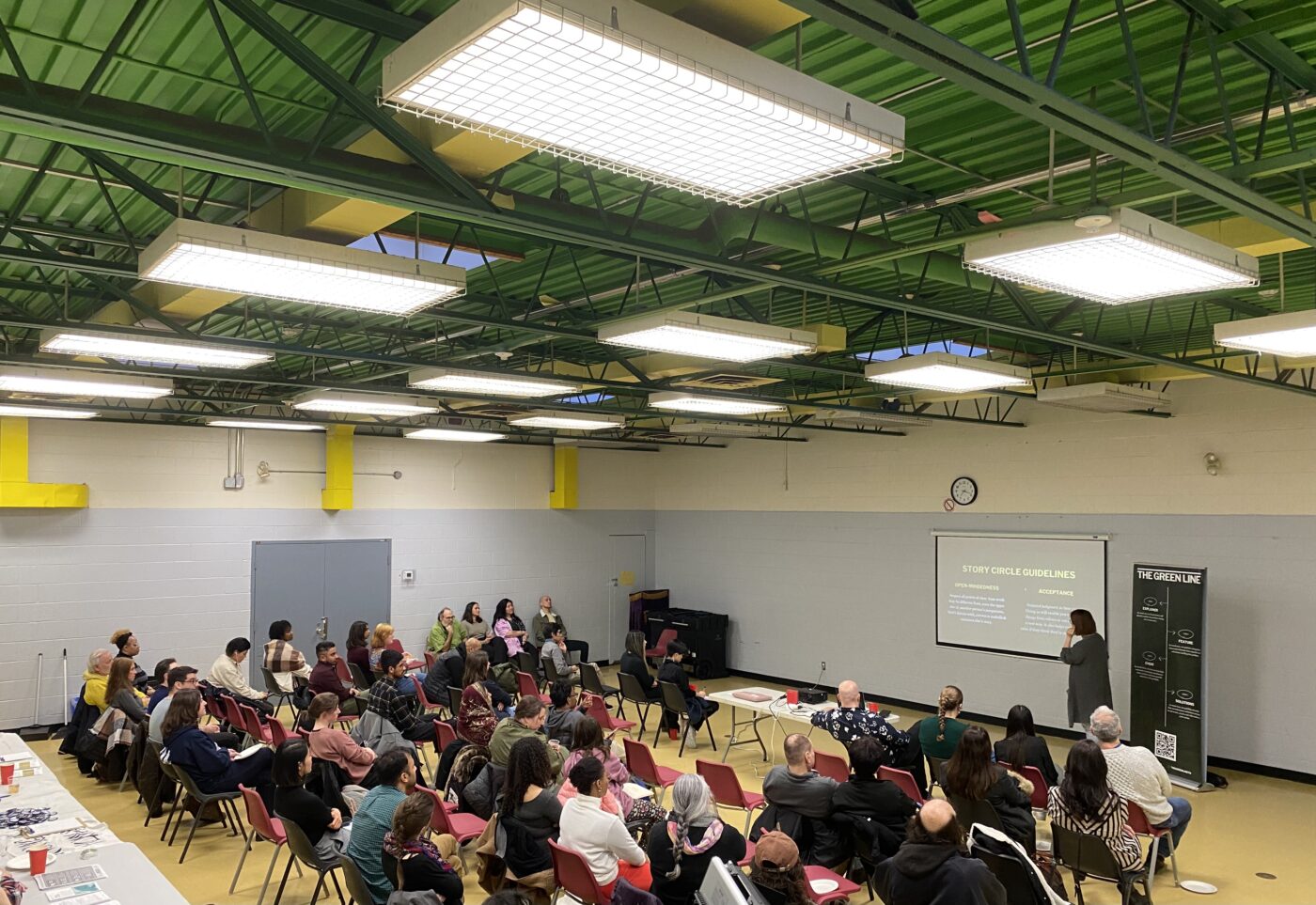
Attendees watch The Green Line editor-in-chief Anita Li present during its Housing Crisis Action Journey at Lawrence Heights Community Centre on Tuesday, March 19, 2024.
Supporting The Green Line means supporting Toronto. Join our membership program today, so you can redefine our city as you see it.


